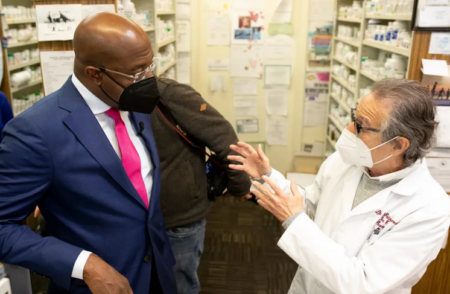Vaccines cause WHAT now? Plus dissolvable epi, another reason for mouthwash, and more
03 Mar 2022
Posted by Andrew Kantor
You gotta believe
Besides Covid itself, what else is likely to cause long-Covid symptoms? Believing you had Covid. French researchers found that there was no relationship between whether someone thought they had Covid and whether they tested positive.
And yet, the people who thought they had the virus reported having more long-Covid symptoms like soreness, fatigue, poor concentration, and trouble breathing. (The only symptom that correlated with actual infection: losing their sense of smell.)
The results “suggest that physical symptoms persisting 10 to 12 months after the COVID-19 pandemic first wave may be associated more with the belief in having experienced COVID-19 infection than with actually being infected.”
Don’t miss out on APhA’s immunization program
Impress your patients, your boss, your mom, and your interior decorator with a slick APhA immunization certificate — the kind you can get through GPhA.
It’s easy: Sign up for “APhA’s Pharmacy-Based Immunization Delivery: A Certificate Program for Pharmacists” on Sunday, May 22. It’s from 8:00 am – 5:00 pm at GPhA’s World Headquarters in Sandy Springs.
Note: This is always a popular course, so the sooner you sign up the less your chance of being left out and being laughed at behind your back.
Get to GPhA.org/immunization for the details and to register. Now!
Senator Warnock visits Ira Katz
U.S. Senator Raphael Warnock visited GPhA’s Ira Katz at Katz’s Little 5 Points Pharmacy in East Atlanta, where he met with patient advocates, insulin users, and pharmacists to discuss the Affordable Insulin Now Act — Warnock’s proposal to cap the cost of insulin at $35.

Not shown, but also there, were GPhA CEO Bob Coleman and AIP VP Jonathan Marquess.
Warnock’s bill is among several similar bills in the House introduced by both Democrats and Republicans, including the “Insulin Cost Reduction Act,” the “Insulin Access for All Act,” the “Seniors Saving on Insulin Act,” and the bill without a name: “To amend title XXVII of the Public Health Service Act, the Internal Revenue Code of 1986, and the Employee Retirement Income Security Act of 1974 to establish requirements with respect to cost-sharing for certain insulin products, and for other purposes.”
Anti-vax field day
So Pfizer had to release the full list of every adverse effect reported by anyone who got its Covid-19 vaccine.
What happens when 42,000 laypeople are told to report any adverse effect after getting a drug? You end up with a 38-page list of more than 150,000 effects, including — I kid you not — epilepsy, herpes*, lupus, and type 1 diabetes.
* I swear, honeybunny, I must have gotten it from the vaccine!
Epi under your tongue
A phase 1 study found that for the first time, a sublingual epinephrine film is as effective as an EpiPen — in fact, it reached its maximum concentration more quickly than a shot. That’s according to a Rutgers University researcher who conducted the study of Aquestive Therapeutics’ AQST-109.
About the size of a postage stamp, the film dissolves on contact and is designed to be used in place of epinephrine injections during the emergency treatment of Type 1 allergic reactions including anaphylaxis.
Doses of AQST-109 (which will obviously get a catchier name) are easy to carry — “kept in a foil sachet that is similar in size and thickness to a business card” — and don’t need an EpiPen’s temperature control.
Next up are, obviously, more studies.
Oral bacteria and blood pressure?
What’s in your mouth? Apparently, the bacteria in older women’s mouths can affect whether they have high blood pressure.
Some (10 kinds) raise the risk of high blood pressure, while others (five kinds) lower the risk. So say epidemiologists from the University at Buffalo publishing in the Journal of the American Heart Association.
It’s not entirely surprising, what with the relationship between gum disease and hypertension, but this narrows the cause down to specific bacteria. Or may have: The study didn’t prove cause and effect, just a connection that needs to be explored. (And it doesn’t just apply to post-menopausal women — that group just had the most notable effects.)
The latest (potential) Covid treatment
The leaf extract is already used to reduce tooth plaque and to treat lice, and now University of Colorado researchers, with their counterparts at the Indian Institute of Science Education and Research, have found that…
… components of Neem bark may target a wide range of viral proteins, suggesting its potential as an antiviral agent against emerging variants of coronaviruses (including SARS-CoV-2).
Their study is in the journal Virology.
Drug spending up, personal costs down
A new report on U.S. drug spending finds that…
- America’s pharmaceutical spending jumped 77% from 2010 to 2020; but
- Out-of-pocket costs for prescription drugs (e.g., copays and co-ninsurance) dropped over the same period.
These days, between their own wallets and their insurance companies’, the average American household spends more than $4,500 on prescription drugs. In Georgia it’s almost double that — $8,280, and we’re in the middle of the pack (#21 out of 50 states and D.C.). But Georgia’s 10-year spending jump is among the highest, at 88% over 10 years.
So why is out-of-pocket spending down? More people have insurance thanks to the ACA, Medicaid expansion, and Medicare Part D and Medicare Advantage. And the study doesn’t show how much health insurance premiums have changed.


